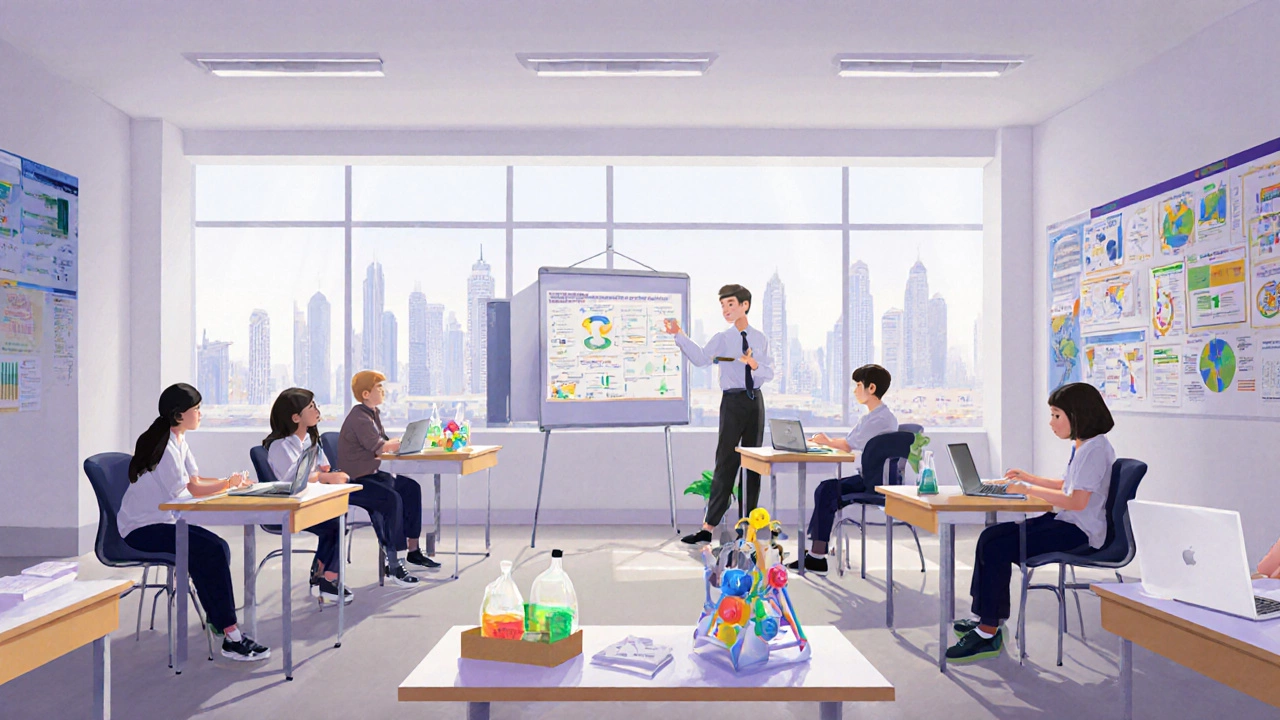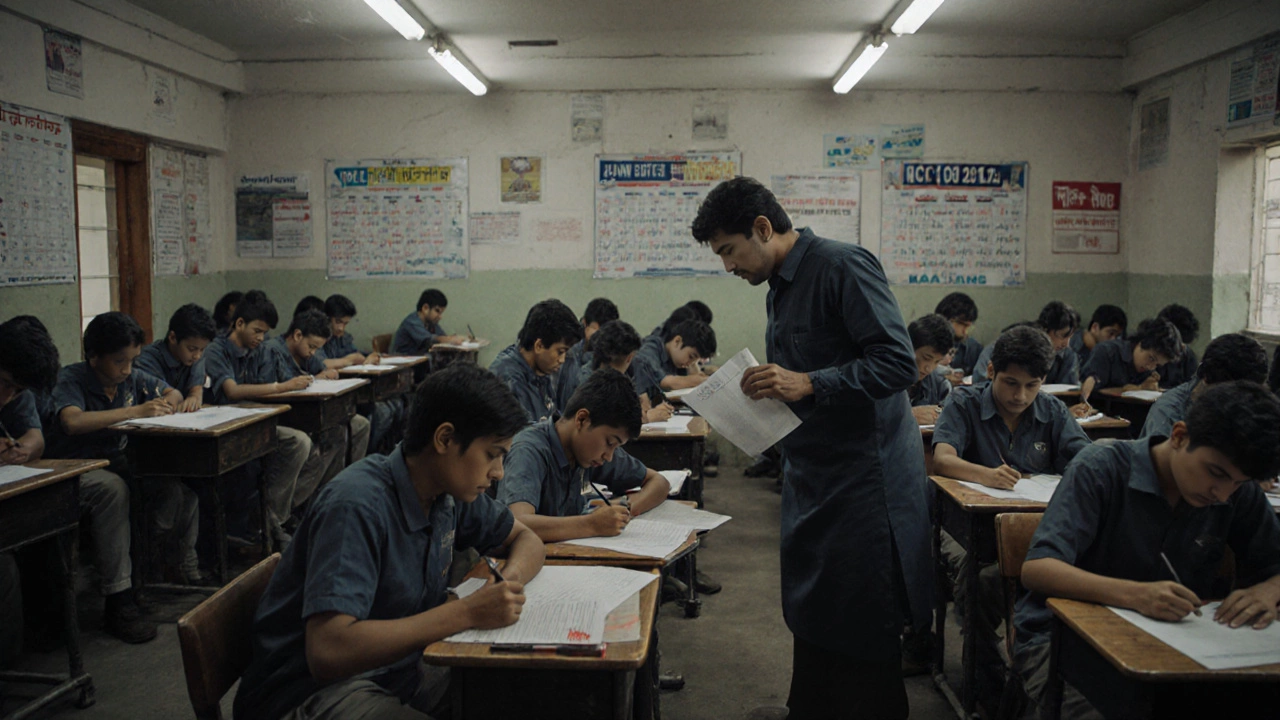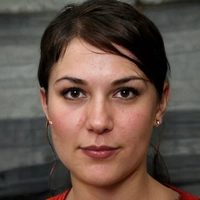University Admission Pathway Calculator
Education Pathway Selection
When parents in India ask if Dubai education is better than India, they’re not just comparing two countries-they’re weighing their child’s future. The question often comes up because so many Indian families live in Dubai, and their kids attend schools that follow either the CBSE syllabus or international curricula like IB or Cambridge. But what does "better" actually mean? Is it test scores? Critical thinking? Stress levels? Or just the chance to get into a top university abroad?
CBSE in India: Structure, Pressure, and Results
The CBSE syllabus, run by India’s Central Board of Secondary Education, is one of the most widely followed systems in the country. Over 20,000 schools teach it, including most private schools in cities like Delhi, Mumbai, and Bangalore. It’s known for being highly structured, exam-focused, and deeply tied to national competitive exams like JEE and NEET.
Students in CBSE schools start preparing for engineering and medical entrance tests as early as Grade 9. The curriculum is dense-especially in math and science-and teachers often drill students on rote memorization to hit high marks. A 2024 survey by the National Council of Educational Research and Training found that 68% of CBSE students in Grade 10 reported feeling "constant pressure" to score above 90%. That pressure doesn’t disappear after Class 12. Many students spend a full year preparing for entrance exams after their board results.
But there’s a flip side. CBSE students consistently rank among the top performers in global assessments like PISA in math and science. Indian students from CBSE schools dominate STEM Olympiads and have high acceptance rates into top engineering colleges in India. If your goal is to get into IIT or AIIMS, CBSE is still the most direct path.
Dubai Schools: International Options and Less Pressure
Dubai doesn’t have one national curriculum. Instead, schools choose from IB, Cambridge (IGCSE/A-Levels), American (Common Core), or even CBSE itself. Over 200 schools in Dubai serve Indian expats, and about 40% of them offer CBSE. But the majority follow international systems.
Students in IB or Cambridge schools in Dubai don’t take one high-stakes exam at the end of Grade 12. Instead, they’re graded over two years on projects, presentations, coursework, and final exams. This reduces last-minute cramming. A 2025 report by the Dubai Schools Inspection Bureau found that 72% of students in international schools reported feeling "moderate to low" stress levels during exams-compared to 68% of CBSE students in India reporting "high" stress.
Dubai schools also emphasize skills like research, public speaking, and independent learning. A Grade 11 student in a Dubai IB school might spend weeks designing a science experiment, writing a 4,000-word extended essay, and presenting findings to a panel. That’s not something you’d typically see in a CBSE classroom, where the focus is on textbook answers.
CBSE in Dubai vs CBSE in India: Is There a Difference?
Many Indian families in Dubai choose CBSE schools because they want continuity with home. But here’s what changes: the teaching style. CBSE schools in Dubai are often run by private operators with better resources. Class sizes are smaller-sometimes 20 students instead of 45. Teachers are better paid and more likely to be trained in modern pedagogy. There’s less pressure to score 95% to be considered "good."
One parent in Dubai told me her daughter, studying CBSE in a Dubai school, had the same syllabus as her cousin in Hyderabad-but her daughter was encouraged to ask questions, use online labs, and even code a simple app for a science project. In India, that same project would’ve been seen as "extra" and possibly discouraged if it took time away from textbook revision.
So the CBSE syllabus isn’t the problem-it’s how it’s delivered. In Dubai, even CBSE schools tend to blend in global teaching practices. In India, the system is often stuck in exam-prep mode.

University Outcomes: Who Gets Into Better Colleges?
Let’s talk outcomes. If your goal is to get into a top university in the U.S., U.K., Canada, or Australia, students from IB or Cambridge schools in Dubai have a clear edge. Universities abroad recognize these curricula as rigorous and well-rounded. They know IB students have written research papers, completed community projects, and handled multiple deadlines.
CBSE students from India can and do get into top global universities-but they often need to stand out in other ways. A high SAT score, strong extracurriculars, or a standout personal essay becomes critical. Many CBSE students in India spend months preparing for the SAT or ACT on top of their board exams.
In 2024, data from the Common App showed that 38% of Indian applicants to U.S. universities came from international schools (mostly in Dubai, Singapore, or the U.S.), while only 22% came from CBSE schools in India. That doesn’t mean CBSE students aren’t capable-it means they need to work harder to prove they’re more than just test scores.
Cost, Lifestyle, and Long-Term Impact
Dubai schools aren’t cheap. Annual fees for an IB school can range from AED 40,000 to AED 90,000 (roughly $11,000-$24,500). CBSE schools in Dubai cost less-AED 15,000 to AED 35,000-but still more than most private schools in India. In India, a good CBSE school might cost ₹1.5-3 lakh per year ($1,800-$3,600).
But cost isn’t just about tuition. In Dubai, families often live in expat communities with access to libraries, museums, science centers, and international events. Kids are exposed to diverse cultures from day one. In India, even in big cities, extracurricular exposure can be limited by time, money, or social expectations.
Long-term, students from Dubai’s international schools tend to adapt faster to university life abroad. They’ve already learned how to manage time, write essays, and speak up in class. CBSE students often struggle with the shift from memorization to critical analysis when they go overseas.

So Is Dubai Education Better?
There’s no simple answer. If you want your child to get into IIT or AIIMS, staying in the CBSE system in India might be the smartest move. It’s direct, proven, and aligned with the exam structure.
If you want your child to think critically, handle real-world projects, and have options to study anywhere in the world, Dubai’s international schools give a broader foundation. Even if they’re on the CBSE syllabus, the environment in Dubai changes how it’s taught.
The real difference isn’t the curriculum-it’s the culture around learning. In Dubai, school is part of life. In India, school often feels like a race.
What Should Parents Do?
Ask yourself these questions:
- Is your child more interested in engineering/medicine in India, or do they want to explore global opportunities?
- Can your family afford the cost difference, and are you ready to support a more open-ended learning style?
- Does your child thrive under pressure, or do they need space to explore?
If you’re in Dubai and your child is on CBSE, don’t assume they’re getting the same experience as in India. Ask the school: "How much time do students spend on projects vs. memorization?" "Do you encourage independent research?" "What’s your approach to exams?"
There’s no perfect system. But there’s a system that fits your child’s future.



